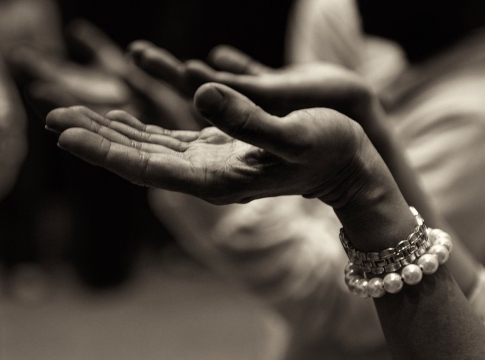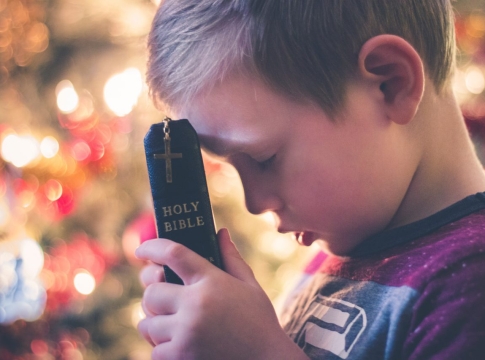
Prayer is a great privilege that we Christians have. We are aware of the significance of prayer and its place in our everyday lives. However, it’s not always simple to pray. Occasionally, we ask the same thing that Jesus’ followers asked: “Lord, teach us to pray” (Luke 11:1).
Using liturgical prayers
Jesus gave His disciples an example prayer, known as the Lord’s Prayer. This is often literally recited by Christians. Later on, churches developed many more prayers that could be used by people to recite literally. A well-known collection of such prayers is the Book of Common Prayers, as used in Anglican churches. But there are many more, in various languages and used by different church denominations. Some of these are general prayers, others specifically suited for particular days or occasions. Such prayers can be helpful if we have difficulty finding the right words to express our thanks or our sorrows, or when our thoughts tend to wander, or when we are so occupied by a particular problem that we can hardly focus on anything else. Balanced liturgical prayers can be very healthy for our prayer lives.
Using your own words
But the Bible makes it clear that we are free to pray in our own language as well. There are no rules about the structure, content, or even the precise language of our prayers. In Matthew 6:7, Jesus makes this quite clear: Do not pile on meaningless words when you pray, as the Gentiles do, believing that their abundance of words will be heard. Avoid following their example, as your Father already knows what you need before you ask.
Both liturgical and personal prayers are valuable
The Bible is full of instances of prayers that were appropriate for a certain situation, conveyed a person’s innermost feelings or uncertainties, and would not be appropriate for other people to replicate in a new setting. This is perfectly OK. Engaging in prayer can be an extremely intimate way to communicate with the universe’s creator. Thus, there is a place for both private and liturgical prayer in the Christian life.
A practical guide how to pray
You may occasionally feel that not all of the personal topics you would like to bring up in your prayer are covered by liturgical prayers. However, if you only speak in your own words all the time, you may find that your prayers are uneven or that you are just saying the same things over and over. If this is a concern for you, the practical advice that follows may be of assistance in creating an honorable, balanced, and personal prayer life for God. To begin, reach out and take your own hand. Every finger represents a different facet of prayer.
Thumbs up: praise God
The thumb is where we begin. The thumbs-up is a very obvious hand gesture for most people. Consider Facebook as an example, where this signal is frequently employed. It conveys support for a person or object. Using this in prayer, our thumb serves as a reminder to give thanks to God for who He is and all that He has accomplished for us. Many instances of praise can be found throughout the Psalms, such as “O Lord, our Lord, how majestic is your name in all the earth!” (Psalm 8:9) Glory to the Lord! Praise the Lord, for He is wonderful, and His unwavering love never ends! Who is able to express the Lord’s amazing acts and all of His praises? (Psalm 106:1-2)
Point to God’s blessings
Subsequently, the pointing finger is employed frequently to indicate objects in our environment. We thank God in our prayer for all of the blessings we have received. “I will magnify God with thanksgiving; I will praise His name with a song” (Psalm 69:30). “I give thanks and praise to You, O God of my fathers, for You have given me might and wisdom, and You have revealed to me what we asked of You, for You have revealed to us the matter of the king” (Daniel 2:23). “First, you all have my gratitude, for your faith is proclaimed throughout the world, through Jesus Christ” (Romans 1:8).
The middle finger: disrespect and sin
Extending the middle finger is generally considered a disrespectful gesture, which shows contempt. Although you probably don’t use it like that literally, the middle finger reminds us of all the times we treat God or others with disrespect. There is often so much sin in our lives that we should confess and ask forgiveness for. Make it a structural element of your prayers to clear away everything that stands between God and you. “If we confess our sins, He is faithful and just to forgive us our sins and to cleanse us from all unrighteousness” (1 John 1:9). The Psalms offer multiple examples of this kind of prayer as well, see for example Psalm 51: “Have mercy on me, O God, according to Your steadfast love; according to Your abundant mercy blot out my transgressions. Wash me thoroughly from my iniquity, and cleanse me from my sin! For I know my transgressions, and my sin is ever before me. Against You, You only, have I sinned and done what is evil in Your sight, so that You may be justified in Your words and blameless in Your judgment.”
The ring finger: how we relate to others
A lot of people wear their wedding rings on their ring finger. This represents the relationships you have with your family, friends, and fellow believers. During this phase of your prayer, spend some time pleading for those in your immediate vicinity. In one of his letters, for instance, Paul prayed, “Brothers, pray for us.” “We have not ceased to pray for you, asking that you may be filled with the knowledge of His will in all spiritual wisdom and understanding,” says Paul in response in Colossians 1:9. In Luke 6:28, Jesus even gives us instructions to “pray for those who abuse you and bless those who curse you.”
Pray for yourself last
Not to mention, the little finger serves as a reminder to pray for ourselves. “Let your requests be made known to God in everything by prayer and supplication with thanksgiving” (Philippians 4:6). We can be certain that God hears us when we cry out to Him in prayer. According to Matthew 7:8, “For whoever asks, receives; whoever seeks, finds; and whoever knocks, will have their door opened.”





